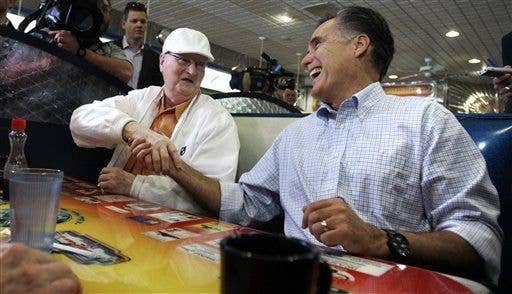
This was the year politics changed forever, we thought. The old habits of handshakes and diners had been replaced by new ones: virtual candidates who entered voters’ living rooms through their paid gigs on Fox News. Celebrities, freaks, and inspirational speakers -- like Donald Trump and Herman Cain -- who dominated opinion polls through the sheer volume of their media presences.
"The usual rules appear to have been turned upside down: The candidates atop the GOP polls have spent the least amount of time meeting with voters and the cellar-dwellers are the ones who have hit the hustings the hardest,” POLITICO’s Maggie Haberman wrote in November.
"In what is shaping up as a profound change in American politics, the living room stops and the cafe visits where candidates offer handshakes and make appeals for support are creeping toward extinction,” the Times’s Jeff Zeleny added later in the month.
The candidates themselves, most of all, believed and fed our hype, and without the thoughtful hedges toward the end of those articles. People like Newt Gingrich and Cain ran what would more traditionally be thought of as godawful, miserable, terrible campaigns. We wrote that they were trying a new method. They were encouraged to keep trying.
But we misunderstood what was really happening. The candidates weren’t inventing a new paradigm. They were just doing it wrong.
And in last night’s Des Moines Register poll -- a crucial final measure that typically accelerates whatever trend it finds -- the three men in the lead were the three how have spent the most time in Iowa over the last six years: Mitt Romney, Ron Paul, and Rick Santorum.
And Santorum is now campaigning on, as much as anything else, the strength of his own campaign, telling Iowans he’s respected their traditions as others have ignored them, a message they welcome.
“As an Iowan, it’s somewhat comforting to see that candidates who do things the way we expect them to be doing things to be doing in Iowa -- spend some time here, get to know us -- seem to be doing well,” said Monte Shaw, a veteran Iowa Republican operative now working for the state's ethanol industry.
The lesson, in the end, doesn’t seem to be that the media primary matters more. It’s that the media primary has grown more detached from the real presidential campaign.
"The old ways of doing business don’t matter to creating the current media storyline -- it’s national polls and national media coverage
matter to creating a national storyline," said Jonathan Prince, a Democratic consultant who helped John Edwards achieve a late surge in 2004 that Santorum’s has echoed. "That national storyline doesn’t matter to what’s going to happen in the state. See: Perry, Rick; Cain, Herman; Gingrich, Newt; Bachmann, Michele."
"They each had a moment that was worth writing about so they have an uptick in national polls -- and everyone is like, ‘The world changed.’"
"The world didn’t change. You’re just paying attention!"
